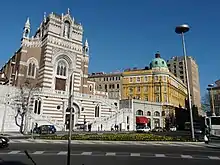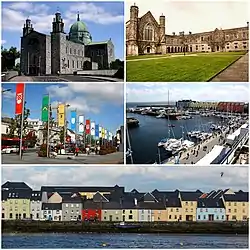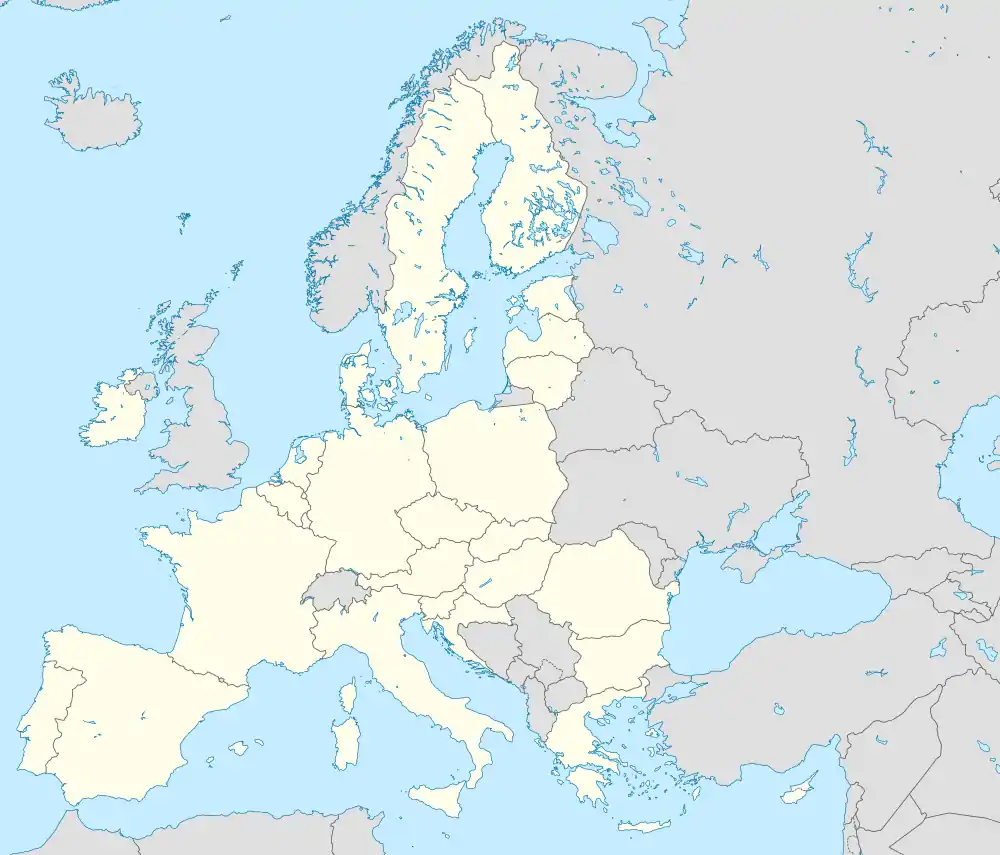European Capital of Culture
A European Capital of Culture is a city designated by the European Union (EU) for a period of one calendar year during which it organises a series of cultural events with a strong pan-European dimension. Novi Sad (Serbia) is the incumbent, 2021 European Capital of Culture.

Preparing a European Capital of Culture can be an opportunity for the city to generate considerable cultural, social and economic benefits and it can help foster urban regeneration, change the city's image and raise its visibility and profile on an international scale.
In 1985, Melina Mercouri, Greece’s minister of culture, and her French counterpart Jack Lang came up with the idea of designating an annual Capital of Culture to bring Europeans closer together by highlighting the richness and diversity of European cultures and raising awareness of their common history and values. It is strongly believed that the ECoC significantly maximises social and economic benefits, especially when the events are embedded as a part of a long–term culture-based development strategy of the city and the surrounding region.[1]
The Commission of the European Union manages the title and each year the Council of Ministers of the European Union formally designates European Capitals of Culture: more than 40 cities have been designated so far.
Selection process
.jpg.webp)
An international panel of cultural experts is in charge of assessing the proposals of cities for the title according to criteria specified by the European Union.
For two of the capitals each year, eligibility is open to cities in EU member states only. From 2021 and every three years thereafter, a third capital will be chosen from cities in countries that are candidates or potential candidates for membership, or in countries that are part of the European Economic Area (EEA)[2][3]– an example of the latter being Stavanger in Norway, which was a European Capital of Culture in 2008.
A 2004 study conducted for the Commission, known as the "Palmer report", demonstrated that the choice of European Capital of Culture served as a catalyst for the cultural development and the transformation of the city.[4] Consequently, the beneficial socio-economic development and impact for the chosen city are now also considered in determining the chosen cities.
Bids from five United Kingdom cities to be the 2023 Capital of Culture were disqualified in November 2017, because by 2023 the UK is no longer an EU member.[5]
History
The European Capital of Culture programme was initially called the European City of Culture and was conceived in 1983, by Melina Mercouri, then serving as minister of culture in Greece. Mercouri believed that at the time, culture was not given the same attention as politics and economics and a project for promoting European cultures within the member states should be pursued. The European City of Culture programme was launched in the summer of 1985 with Athens being the first title-holder. From 1985, the year when ECOC program was launched, to 2010, during this period, the European City of Culture program was renamed to European Capital of Culture.[6]
List of European Capitals of Culture


1 The European Capital of Culture was due to be in the UK in 2023. However, due to its decision to leave the European Union in 2016, UK cities would no longer be eligible to hold the title after 2019. The European Commission's Scotland office confirmed that this would be the case on 23 November 2017, only one week before the UK was due to announce which city would be put forward.[21] The candidate cities were Dundee,[22] Leeds, Milton Keynes,[23] Nottingham[24] and a joint bid from Northern Irish cities Belfast, Derry and Strabane.[25] This caused anger amongst the UK candidate city's bidding teams due to the short notice of the decision, and because of the amount of money they had already spent preparing their bids.
2 A new framework makes it possible for cities in candidate countries, potential candidates for EU membership or EFTA member states to hold the title every third year as of 2021. This will be selected through an open competition, meaning that cities from various countries may compete with each other.[8]

See also
References
- Burkšienė, V., Dvorak, J., Burbulytė-Tsiskarishvili, G. (2018). Sustainability and Sustainability Marketing in Competing for the Title of European Capital of Culture. Organizacija, Vol. 51 (1), p. 66-78 https://content.sciendo.com/view/journals/orga/51/1/article-p66.xml
- "Decision No 445/2014/EU of the European Parliament and of the Council of 16 April 2014". 3 May 2014.
- "European Capitals of Culture 2020 to 2033 — A guide for cities preparing to bid" (PDF). European Commission.
- Palmer, Robert (2004) "European Cities and Capitals of Culture" Part I. Part II. Study prepared for the European Commission
- "Brexit blow to UK 2023 culture crown bids". BBC News. 23 November 2017. Retrieved 23 November 2017.
- Kiran Klaus Patel, ed., The Cultural Politics of Europe: European Capitals of Culture and European Union since the 1980s (London: Routledge, 2013)
- Association of European Cities of Culture of the Year 2000
- "European Capitals of Culture". European Union. 5 June 2015. Retrieved 6 June 2015.
- "Banská Bystrica sa bude uchádzať o titul Európske hlavné mesto kultúry 2026" [Banská Bystrica will apply for the title of European Capital of Culture 2026]. bystricoviny.sk (in Slovak). 1 May 2020. Retrieved 4 May 2020.
- "Hlohovec chce byť Európske hlavné mesto kultúry 2026" [Hlohovec wants to be the European Capital of Culture in 2026]. hlohovec.sk (in Slovak). 30 April 2020. Retrieved 4 May 2020.
- "Trenčín sa chce stať Európskym hlavným mestom kultúry" [Trenčín wants to be the European Capital of Culture]. mytrencin.sme.sk (in Slovak). 1 June 2020.
- "Trnava má záujem uchádzať sa o titul Európske hlavné mesto kultúry v roku 2026" [Trnava is interested in applying for the title of European Capital of Culture in 2026]. trnava-live.sk (in Slovak). 28 April 2020. Retrieved 4 May 2020.
- "Žilina sa chce uchádzať o Európske hlavné mesto kultúry 2026" [Žilina wants to apply for the European Capital of Culture 2026]. teraz.sk (in Slovak). 20 February 2020. Retrieved 4 May 2020.
- "Three cities short-listed for European Capital of Culture 2026 in Finland". European Commission. July 2020. Retrieved 8 December 2020.
- "Three cities in Finland bidding for title of the 2026 European Capital of Culture". Ministry of Education and Culture. Retrieved 21 June 2020.
- "Jūrmala startēs titula "Eiropas kultūras galvaspilsēta 2027" iegūšanai". Travelnews.lv. Retrieved 29 October 2020.
- "Liepaja to put its name to become European Capital of Culture in 2027". The Baltic Course. Retrieved 23 September 2020.
- "RUM". Rum.pt. Retrieved 25 June 2017.
- "Brno Steps Up Preparations For 2028 European Capital of Culture Bid". brnodaily.cz. Retrieved 14 March 2019.
- "Leuven stelt zich kandidaat als Europese Culturele Hoofdstad 2030". demorgen.be. Retrieved 17 December 2017.
- Brady, Jon (23 November 2017). "Brexit destroys Dundee's hopes of being European Capital of Culture in 2023". Evening Telegraph. Retrieved 23 November 2017.
- Lorimer, Scott. "The latest news and sport from Dundee, Tayside and Fife". Evening Telegraph. Retrieved 25 June 2017.
- "European Capital of Culture". www.milton-keynes.gov.uk. Milton Keynes Council. Archived from the original on 6 June 2017. Retrieved 12 January 2016.
- "Nottingham 2023".
- Meredith, Robbie (5 July 2017). "NI councils make bid for European Capital of Culture title". BBC News. Retrieved 5 July 2017.
External links
| Wikimedia Commons has media related to European Capital of Culture. |
- European Capitals of Culture
- Decision No 1622/2006/EC of the European Parliament and of the Council of 24 October 2006 establishing a Community action for the European Capital of Culture event for the years 2007 to 2019
- Decision No 445/2014/EU of the European Parliament and of the Council of 16 April 2014 establishing a Union action for the European Capitals of Culture for the years 2020 to 2033 and repealing Decision No 1622/2006/EC